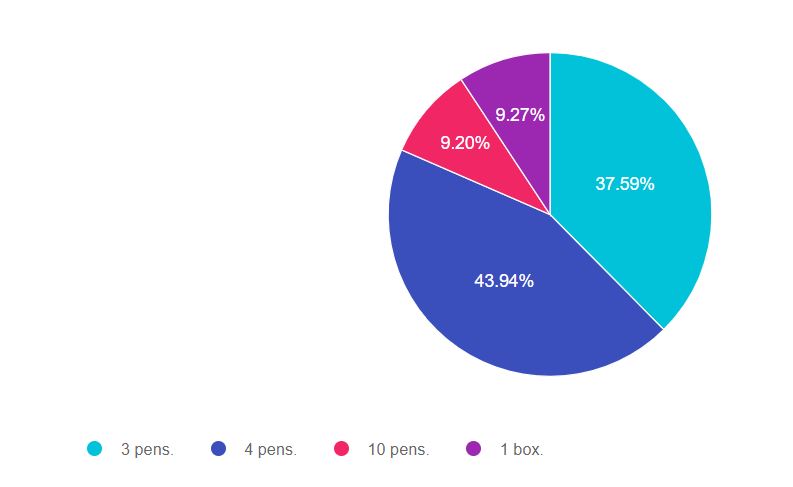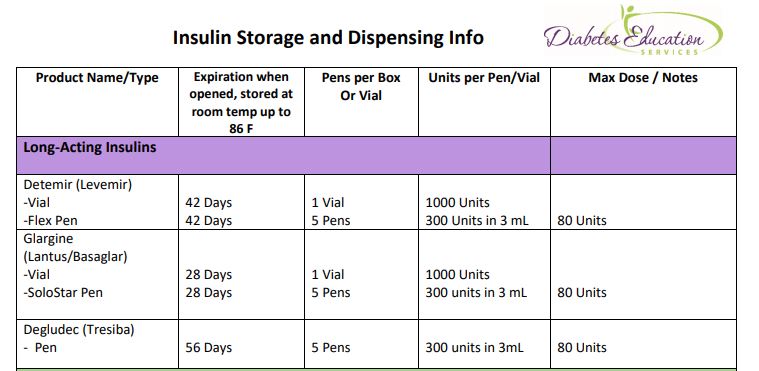
Our March 23rd Question caused a lot of commotion. Less than half (43%) of respondents chose the best answer, so we wanted to dive deeper into this question of how many pens are needed.
Before we start though, if you don’t want any spoilers and haven’t tried the question yet, you can answer below: Answer Question
Question: JR is 24 years old and uses an insulin pen for their basal insulin injections each evening. JR takes 30 units a night and each insulin pen holds 300 units of insulin.
How many insulin pens would JR need for one month?
Answer Choices:
- 3 pens
- 4 pens
- 10 pens
- 1 box

As shown above, the most common choice was option 2, the second most common answer was option 1, then option 4, and finally option 3.
Getting to the Best Answer
We had over 1,500 attempts at getting to the best answer. If you are thinking about taking the certification exam, the content of this practice test question will set you up for success. The exam will present questions that require test takers to make sure the answer matches the key intent of the question. This is also a word problem. Setting up the problem correctly before doing the math is very important.
In this situation, we are asked to answer, “How many insulin pens would JR need for one month?” The main goal of this question is to make sure that test-takers incorporate the 2 unit air shot into calculating how much insulin is needed for the month.
Answers & Rationale
Answer 1 is incorrect, 37.59% chose this answer, “3 pens.” JR takes 30 units of basal insulin a night. However, we know that JR needs to prime their insulin pen with a 2 unit air shot before each injection. To make sure the insulin pen and needle are working correctly, we instruct people to use a new pen needle and to prime the pen before injection. This means that JR will use 32 units of insulin each night (30 units for the injection, 2 units to prime the pen).
32 units x 30 days = 960 units. If each pen holds 300 units, 3 pens only hold 900 units. JR would run out of insulin at least 2 days ahead of time. For this reason, this answer is not correct.
Answer 2 is correct, 43.94% of you chose this answer, “4 pens.” Great job. You considered that JR needs to prime their pen before each injection.
JR takes 30 units of basal insulin a night. We know that JR needs to prime their insulin pen with a 2 unit air shot before each injection. To make sure the insulin pen and needle are working correctly, we instruct people to use a new pen needle and to prime it before injection. This means that JR will use 32 units of insulin each night (30 units for the injection, 2 units to prime the pen).
32 units x 30 days = 960 units. If each pen holds 300 units, JR will need 4 insulin pens for the month.
Answer 3 is incorrect, 9.20% of you chose this answer, “10 pens.” This was a juicy answer. Respondents who chose this probably looked quickly at the question and divided 300 by 30 to get 10 pens. In this question, paying attention to the details before diving into math is really important.
Each pen holds 300 units and JR takes 30 units of insulin a night. When you add in the 2 units to prime the pen, JR needs 4 insulin pens a month.
Answer 4 is incorrect, 9.27% of you chose this answer, “1 box.” This is another juicy answer. But, it doesn’t match the unit of measure of the question. The question asks, how many insulin pens and this response answers with a different unit, 1 box. The question also doesn’t ask how the prescription would be written. It only asks for how many pens. For this reason, this is not the best answer.
However, in the clinical setting, the prescription would be written for a box of 5 pens, since that is the usual dispensing unit.
Insulin Storage Cheat Sheet – Download for FREE. Provides all kinds of important details on the storage of different types of insulin pens, vials, and more!

We hope you appreciate this week’s rationale! Thank you so much for taking the time to answer our Question of the Week and participate in this fun learning activity!
Sign up for Diabetes Blog Bytes – we post one daily Blog Byte from Monday to Friday. And of course, Tuesday is our Question of the Week. It’s Informative and FREE! Sign up below!
[yikes-mailchimp form=”1″]Accreditation: Diabetes Education Services is an approved provider by the California Board of Registered Nursing, Provider 12640, and Commission on Dietetic Registration (CDR), Provider DI002. Since these programs are approved by the CDR it satisfies the CE requirements for the CDCES regardless of your profession.*
The use of DES products does not guarantee the successful passage of the CDCES exam. CBDCE does not endorse any preparatory or review materials for the CDCES exam, except for those published by CBDCE.









